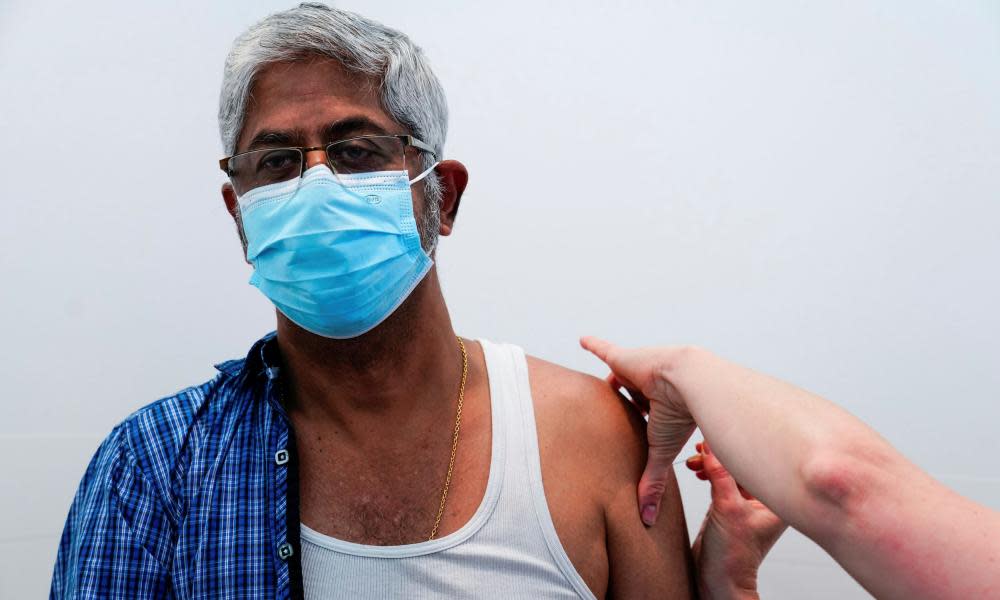Australia considers approving Pfizer Covid vaccine for standard cold storage

Pfizer’s Covid-19 vaccine could soon be delivered at temperatures 50 degrees warmer than currently required if Australia follows the US’s lead to ease the rollout.
The potential change in storage temperature requirements is being considered as the federal health department confirmed that 25 Pfizer vaccine vials – at least 125 doses - were spoiled at St Vincent’s care services in Werribee because it was not possible to verify their temperature had been maintained.
The US Food and Drug Administration has announced it will allow the vaccines to be transported and stored at conventional pharmaceutical freezer temperatures for a period of up to two weeks.
Related: Australia's Covid vaccine rollout: early errors, cancellations and missed deadlines
The move follows Pfizer and BioNTech notifying the FDA the vaccine is stable and effective if stored for two weeks at -15C to -25C.
On Friday a Pfizer spokesperson told Guardian Australia it will submit the same data to other regulators including Australia’s Therapeutic Goods Administration in coming weeks.
If approved by the TGA, that could lead to a relaxation of the current requirement that Pfizer vaccines must be kept at -70C, which limits distribution to centralised hubs and makes it unlikely people in remote areas will be given Pfizer vaccines.
A spokesperson for Pfizer said “if approved by regulators such as the … TGA, the new storage option could offer vaccination centres greater flexibility in managing and maintaining vaccine distribution and supply”.
“No changes have been made to the vaccine to enable this potential storage change.
“The new storage condition is the result of ongoing stability studies being conducted at a variety of temperature ranges.”
According to Pfizer’s data, vaccine quality remains within specifications after storage for two weeks at -15C to -25C and for six months at -60C to -80C.
“Frozen conditions ensure the RNA and lipid nanoparticle are within specifications.”
Related: Australia Covid vaccine tracker: how is the rollout progressing and when will you get the jab?
Scott Morrison told reporters in Sydney the approval in the US for Pfizer in standard cold storage was “potentially exciting news” .
“Our contract with Pfizer includes dealing with cold chain logistics and delivery of those doses. [Pfizer] are saying that can now be done at a [pharmaceutical] refrigerator temperature.”
Morrison said the health minister Greg Hunt had been in touch with the head of the TGA John Skerritt to consider the new information at the “earliest opportunity”.
Morrison said that “new information” is always welcome to help learn from new science to refine the rollout, but noted that Australia would only move forward with TGA approval.
Earlier, the ABC reported that the federal health department was assessing whether 25 vials of Pfizer vaccine that were thawed and refrigerated at a Werribee aged care centre have been spoiled.
In a statement, the health department said Aspen Healthcare had reported there were 25 unused vaccine vials in an on-site refrigerator after it conducted vaccinations at St Vincent’s, an aged care centre in Werribee, on Wednesday.
“The Pfizer vaccine can be stored in a refrigerator at 2-8C for up to five days,” it said.
“While refrigeration was maintained it was not possible to verify that temperature was maintained throughout.
“Therefore, out of an abundance of caution, a medical decision was made not to use the remaining vials.”
The health department thanked “the Aspen Healthcare worker who responded resourcefully and took action to ensure both use of the vaccines” – implying that some surplus vaccines were salvaged – and the “protection of the integrity of the unused vials”.
“This represents 0.15% of week 1 doses distributed and the loss rate has been far lower than expected and assumed which is a tribute to all involved.”
Related: Pfizer Covid vaccine 94% effective in peer-reviewed, real-world mass study
Earlier, Morrison dodged a question about what he knows about the reported potential waste of vaccine doses in Werribee, choosing instead to discuss the progress of the rollout generally.
Morrison said after four full days of the rollout, more than 90 aged care facilities, 6,500 people in aged care and a total of 23,000 Australians had received vaccinations.
“In the early days where there are logistical difficulties ... they’re worked through,” he said, noting that two patients who received four times the recommended dose of Pfizer vaccine are both well.
“Where things are learned in the early phase of the rollout, they will be applied.”

 Yahoo Movies
Yahoo Movies 
